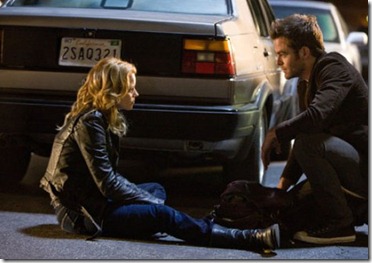Alex Kurtzman’s debut as a film director (he’s co-written Transformers, Star Trek, ten episodes of Alias), People Like Us, is inspired by true events. It’s the story of an ambitious hustler working in ‘barter, the original money’ who learns a shocking truth after a very bad day.
Same (Chris Pine) is the abovementioned hustler who learns on one particular day that a trade he’s facilitated has literally exploded; his commission from his latest deal is being taken by his boss (Jon Favreau) to placate one of the injured parties; the Federal Trade Commission is probably going to be investigating the company in general and him in particular, and, to cap things off on a positive note, his father has died.
Though he tries to avoid the funeral, Sam’s girlfriend, Hannah (Olivia Wilde) is too resourceful and they find themselves at his childhood home – where his mother, Lillian (Michelle Pfeiffer) is not overly thrilled to see him.
The next day, the family lawyer (Philip Baker Hall) informs Sam that he’s been left his father’s vinyl album collection and a shaving kit. The kit contains $150,000 and a terse note stating the money is for Josh, an address, and the instruction to ‘take care of them.’ Which leads Sam to the discovery that he has a sister, Frankie (Elizabeth Banks), he never knew existed. Josh (Michael Hall D’Addario), it turns out, is her eleven-year old son – whom we meet as he tosses a block of sodium into his school’s swimming pool with the expected result.
Frankie is an alcoholic, as Sam learns by following her to an AA meeting –which is where he discovers she’s his sister. Being a coward, he awkwardly begins getting to know her without telling her who is really is – a decision that leads to an expected consequence later.
While he’s trying to figure out what to do about Frankie and Josh – Hannah having decamped back to New York (because he’s been an ass) – Sam is also trying to figure out his relationship with his mother. Unfortunately, as he begins to figure out that relationship, he’s digging himself into a deeper hole with Frankie. Despite his assurances that he’s never going to hit on her, his interest in her and Josh seems to be sending her different singles.
Maybe it’s because he knows who she really is, in combination with his basic cowardice, that Sam doesn’t recognize how Frankie is taking his interest. Maybe it’s just – as I have been told on more than one occasion by a woman – that relationship-wise, men are stupid, but Sam’s inability to just tell her really doesn’t seem like it’s stretched too far.
Finally, though, with the FTC now hounding him on the phone and Frankie’s attitude towards him changing, you know he is going to have to make the conscious choice to grow-the-heck-up and take some responsibility.
As its dramedy of errors unfolds, People Like Us exerts a kind of a spell – like an accident we see in process but cannot look away from. Despite Sam being every kind of irresponsible jerk, Pine find something deep within us that keeps us from reviling him, and it’s not just that he’s good looking and, however falsely, charming. It’s because his being a jerk is a kind of armor that protects him from facing his vulnerability.
Frankie is at the other end of the spectrum – she’s never going to hide her vulnerability. No matter how hard she tries to tough it out, she never convinces anyone – let alone herself – that she’s got it all figured out. That’s why she reacts the way she does to Sam.
Lillian, on the other hand, is tough – maybe too tough. Though Pfeiffer plays her as brittle at first, she slowly reveals the depths of her character in surprising ways.
Even so, it’s Josh who’s the smartest character in the movie. He’s not just the mad scientist at school; he’s also perceptive as heck. His actions are key, and D’Addario plays him with just enough soulfulness to make his momentary lapses of good judgment tolerable.
Kurtzman directs with an eye toward pacing, but frequently goes for one edit too many in a sequence. The result is that People Like Us plays like an action movie take on a family drama. He fares better at getting good performances from his cast, and setting an environment.
The difference between Sam’s family home in a middle class neighborhood is a stark contrast to Frankie’s budget motel suite – and the pace of life in Los Angeles is near comatose when compared with life in New York. Kurtzman does good things with contrasts whether it’s cities or characters.
People Like Us is family dramedy that tugs at heartstrings and tickles funnybones in about the right proportion. Its contrivances are obvious on reflection, but while the film is playing out, we’re drawn right in. Ultimately, it works – and provides a really good option for anyone who’s worn out from blockbuster fatigue.
Final Grade: B+
Photo courtesy of Walt Disney Studios

“People Like Us” is a story ‘based on true events’ about a very dysfunctional family that includes a brother (son) who is totally unaware of his half-sister. A very different experience with good performances.
GRADE = “B+”